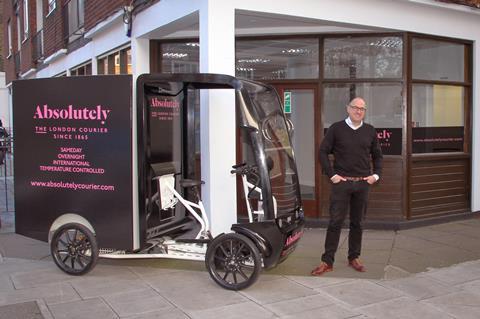
In the era BC (Before COVID-19) same-day couriers were the preserve of the rich and famous who just had to have that diamond ring today or City businesses such as legal or banking where urgent paper documents had to be delivered physically rather than by email. But the lockdown has changed that, according to Stuart Godman, CEO of London courier group Absolutely.
Godman, pictured, is no stranger to the express delivery world, starting out with TNT in 1988 before moving on to Target Express where he was sales and marketing director for 10 years before the ill-fated merger with City Link. He became MD of the combined business until 2010, which was turning over £400m and employed 5,000 people, prior to it going bust at Christmas 2014.
In 2014 he had already moved onto DX (which used to stand for ‘document exchange’ before changing its moniker to ‘delivered exactly’) and Smith News’ parent Connect Group before taking the top job at Absolutely in October 2019.
Since then, the world has been turned on its head by the COVID-19 pandemic and subsequent economic lockdowns. Has the cloud of COVID-19 had a silver lining for Absolutely?
“Yes and no,” says Godman. “The world of same-day is vastly different from overnight express parcels. The speed of how same-day operates in London is fantastic but when we got to the end of March 2020, when London hit that first deep lockdown, it was like trying to operate in a ghost town. It was really quite bizarre.
“But it recovered and we are blessed to be in this sector compared to many other industries. We are not complaining.”
Godman’s profile on the Absolutely website says: “I am ‘absolutely’ committed to ensuring our customers get the experience they deserve whilst embracing a safe and successful environment for all our colleagues to enjoy.”
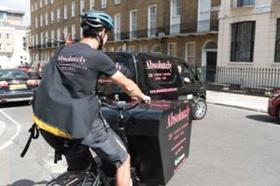
A member of the APC parcels courier network, Absolutely describes itself as “THE London courier since 1865” and things have come full circle as the firm’s environmental commitment means its black and pink-clad couriers are now just as likely to be pedalling bicycles, or riding electric cargo bikes, as driving a van these days.
When offices closed, central London’s B2B same-day market collapsed as people started working from home, but this in itself presented new opportunities.
“Historically the business’s sweet spot was the Square Mile,” says Godman. “It was a large pushbike circuit doing deliveries within half a mile across the central London postcodes. But over the years the business has migrated outside the Square Mile and since the pandemic it has stretched even further and a lot of our work is now into the Home Counties.
“A lot of commuters live in the suburbs so we have moved a lot of work between the offices in London back out to people’s homes and vice versa. So, the shape of the business has changed dramatically in the last year.”
As a result, the company has expanded its territory to cover what Godman calls “Greater London” ie all London postcodes. These cover a huge area of 240 square miles from Hackney in the north (N1) to Croydon in the south (SE25) and from Hanwell in the west (W7) to Greenwich (SE28) in the east.
“That’s our footprint,” he says. “We have considered expanding further geographically but it’s not on our immediate radar. It’s always an option. If we can grow outside London either organically or through acquisition that is something we will consider.”
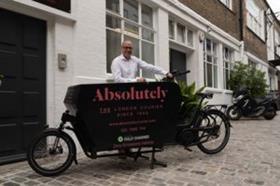
Absolutely began investing in e-cargo bikes as well as electric vans in 2018 ahead of the introduction of the London Ultra Low Emissions Zone and now has over 30 electric vehicles including some able to carry temperature-controlled products.
“The cargo bikes have been a God send in terms of the strategy to invest in that part of the business,” says Godman. “They have picked up more of the work that came out of the pushbike circuit and also work from van circuit. We have seen volumes of work move into different parts of the fleet.
“The van circuit is great for Home Counties and distance work but the cargo bikes – because we have invested in a larger fleet – cover more London postcodes.”
The wider operating area coupled with the limited range of the older cargo bikes has meant an expansion of the depot network from three to four, the fourth dubbed the ‘Eco Hub’, being a 5,000sq ft zero-emissions depot in Holborn. The other three are in Park Royal, which is mainly for APC overnight parcels, an international depot at Heathrow, and another site in Holborn close to the Eco Hub. Newer model Fully Charged e-cargo bikes however have larger ranges enabling them to handle longer rounds.
“There are three options and we have been exploring all three,” says Godman. “One is you have more operating nodes, second you look at the battery life and recharging so we send the cargo bikes out with dual batteries so they can swap over and we have invested in more charging points, and third is newer technology cargo bikes that we have invested in, which have far greater battery capacity so their range is much further.
“We tend to go for the 40-mile range option which is fantastic for the London circuit.”
The latest bikes also have greater carrying capacity and are able to carry eight archive boxes, the standard unit of measure for B2B City couriers.
“The traditional same-day courier carries quite small items and an average cargo bike does 20 to 25 drops a day,” says Godman. “They take it from A to B and then go to another A to B job – it’s not like a milk round where they go round to set delivery points. A typical van on the same-day circuit would do 10 drops so the bikes are twice as effective which is one of the benefits of having the bikes on the fleet.”
Absolutely’s e-cargo bikes now do 95% of APC overnight collections and 49% of its regular same-day circuit work.
The lockdown and closing off most offices in London has led to a shift in Absolutely’s type of work.
“The B2C element has grown dramatically in the last year,” says Godman. “The two sectors we have seen the most growth in have been medical/healthcare and food. In the period between the second and third lockdowns, in the autumn of 2020, we started to see people return to London and that gave us a nice injection of volume.
“The third lockdown quashed that. I think in the summer, when the vaccine has been deployed, there will be a migration back to London. But it won’t ever look the same as it did before. The pandemic has given everyone chance to review their working practices. Do employers really need all their colleagues coming into London five days a week? People will return to work in the City but it might be two or three days a week.”
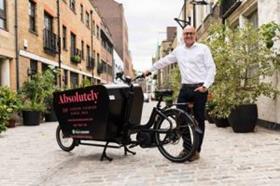
This shift to working from home, or more local offices, has led to a change in the type of work Absolutely does. Its top 10 customers have seen an average year-on-year growth of 36% through the pandemic, notably in the food and drink and healthcare sectors, though fashion has held up well.
“Consumers are changing their behaviour which is impacting on what was traditionally a same-day movement,” says Godman. “People still want to buy stuff and have it delivered in a two-hour window, which is what we offer to many of our clients.
“There is still the traditional circuit work such as tenders and legal documents that have to be moved around the City for signatures etc. But because COVID-19 has made more people work from home and embrace e-commerce that is generating a different type of traffic. We can penetrate a lot of postcodes very quickly in a pretty cost-effective way because we have scale and volume.”
When Godman mentions food couriers are not competing with Deliveroo to deliver pizza and curry. His same-day clients are usually high-end subscribers to premium weekly or daily upmarket recipe services such as Detox Kitchen, where clients receive boxes of fresh ingredients to make their lobster linguine at home without the inconvenience of going to the shops.
Although the majority of Absolutely’s 250 couriers are self-employed, all the electric vehicles they use are recharged at the depots overnight.
“We have electric charging points in all our locations,” says Godman. “All company cars are electric too and are charged at our locations. We practice what we preach.”
The company was fortunate in that the electricity supplies at its three original depots could cope with the recharging load but it has had to reinforce the supply at the new Holborn site to “future proof” it against growing demand.
As with its electric vans, Absolutely has not yet settled on a single supplier for its charging systems but Godman says that is something it will be reviewing in 2021. He would like to see a standardised EV charging connection so that any vehicle can connect to any charger rather than each OEM going with a proprietary system.
He also wants to see a lot more public charging points in London. “OK there are now just over 6,000 but they are geared more for cars than vans,” he says. “The parking bays are not big enough for electric vans. There doesn’t seem to be anybody taking the lead on this. Whether it will be led by TfL, the private sector or the OEMs is still not clear.”
‘Co-opetition’ the only way to clean up London deliveries
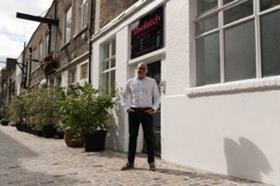
While measures such as TfL’s Ultra Low Emissions Zone, which from October will require non-Euro-6 trucks and vans to pay £100 a day inside the North and South Circular roads, are encouraging the adoption of cleaner vehicles, Absolutely’s new Eco Hub is preparing the company for far tougher restrictions.
These include greater pedestrianisation of central London streets or even enforced co-operation between competitors to require consolidation of last-mile deliveries onto zero-emissions vehicles.
“The best way to clean up London is to reduce the number of vehicles and increase the drop density,” says Godman. “That is really only going to work with more ‘co-opetition’ between the players. There are certain European cities where that has happened already.
“One of my dreams for the Eco Hub is that we become a central London consolidation site so we can work with the major players and deliver the final mile where we are best in class. We can do a 60-minute delivery anywhere in central London on carbon-neutral vehicles.”
The rise in e-commerce has worsened the problem of multiple vehicles – often diesel vans – making single deliveries to individual addresses in the same street, and it would be far more efficient to consolidate these onto a single electric vehicle.
“One of the downsides of Covid-19 is repeat deliveries all day,” Godman goes on. “If people could have one delivery a day rather than six or seven separate items it would be better for the end recipient too. I’m a big fan of co-opetition – there is enough out there for everybody to have a great business but sometimes working together is a better solution.”














